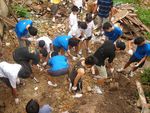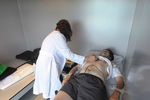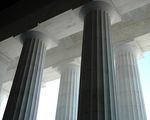Discovery in the Age of Wikipedia - Exposure on the world's most-visited reference site
←
→
Page content transcription
If your browser does not render page correctly, please read the page content below
Discovery in the Age of Wikipedia Exposure on the world’s most-visited reference site Jake Orlowitz @WikiLibrary goo.gl/vsBSkV
Wikipedia’s mission Imagine a world in which every person on the planet shares in the sum of all human knowledge
“And the pile grew and everyone jumped up and
down in it having a wonderful time. And it grew
some more, and it became the biggest leaf pile
anyone had ever seen anywhere, a world wonder.”
- NY Review of Books"Our revolution is like Wikipedia. Everyone was
contributing small pieces, bits and pieces. We drew this
whole picture of a revolution. And that picture - no one is
the hero in that picture."
-Wael Ghonim, Egyptian ActivistWikipedia’s scale 30 million articles 2 billion edits 288 languages 8000 views per second 500 million monthly visitors 6th most popular website 2000x larger than Britannica 8th highest doi referrer
Wikipedia’s ubiquity ● 50% to 90% of physicians use Wikipedia ● 94% of medical students use Wikipedia
Wikipedia’s why Fast, easy, and free to access Understandable Comprehensive Generally accurate
Wikipedia’s volunteers 20 million registered 80,000 active users 1,400 admins
Wikipedia’s pillars Neutral point of view Verifiability Consensus Civility Open copyright
An early study in the journal Nature said that in 2005,
Wikipedia scientific articles came close to the level of
accuracy in Encyclopædia Britannica and had a similar rate of
"serious errors".[2]
Between 2008 and 2012, articles in medical and scientific fields
such as pathology,[5] toxicology,[6] oncology,[7] pharmaceuticals,
[8]
and psychiatry[9] comparing Wikipedia to professional and
peer-reviewed sources found that Wikipedia's depth and
coverage were of a high standard.
--Reliability of Wikipedia, WikipediaVirtual filter 1. Edit Filter automatically rejects known vandalism patterns 2. ClueBot reverts and flags suspicious edits with a machine-learning bot 3. Humans review malicious changes tagged with language recognition tools 4. Vandalism patterns are checked against metadata and historical trends 5. Recent changes patrollers scroll through new edits 6. Editors alerted to each change on all pages in their article watchlist 7. Specialists and experts report and fix mistakes when they see them 8. Millions of readers identify and correct errors when they come upon them 9. Link blacklists lock out known spam sites and unreliable sources 10. Detection mechanisms to determine conflict of interest 11. Administrators to block disruptive editors and protect pages
Wikipedia literacy ● Engage with global audience ● Identify bias and evaluate credibility ● Review literature with proper citation ● Avoid plagiarism and respect copyright ● Construct knowledge to fill content gaps ● Discourse in a community of practice ● Think critically and reflect on process ● Digital citizen in an online collaboration
The Scholar Connection Wikipedia is as good as its sources Scholars are the best sources Wikipedia has the most eyeballs Connect a circle of research & dissemination Wikipedia as starting point for deeper learning
The Wikipedia Library Gain access to paywalled sources Facilitate research for editors Connect to libraries and librarians Lead to free and local sources Promote more-open access
Access partnerships Incorporate closed-access sources Donations for mutual benefit Vetted most-active subject editors Requirements in line with terms of use High impact metrics
Links from 361 to 574 (+ 59%, in blue)
Links from 645 to 2690 (+ 417%)
External Links to Newspapers.com TWL partnership launch Links from 1,198 to 3,975 (+330%) OA clippings from 358 to 1,856 (+520%)
+186% sessions +252% new users +100% transactions +44% revenue
“Things changed
when the
international
sanctions against
Iran expanded...
However, thanks By getting global editors like me free
to the Wikipedia access to rich digital libraries, we will
Library, I received be even more encouraged to write
JSTOR access decent articles about our
culture.”Thinking big
What if every publisher donated
free access to the 1000 most active
Wikipedians in that subject area?Wikipedia Visiting Scholars Academic tradition Research affiliates Unpaid, remote Full access to collections Conduit to Wikipedia’s community
Scholarly impact Successful pilot 25 articles each 4 schools 5 scholars Exposing collections
Featured Impact By one TWL Visiting Scholar Wehwalt at George Mason 1. John Tyler 2. Franklin Pierce 3. John Hay 4. Judah P. Benjamin 5. The Bread-Winners 6. Babe Ruth 7. William H. Seward 8. Gilbert du Motier, Marquis de Lafayette 9. Horace Greeley 10. Benjamin R. Tillman 11. Wreck of the S.S. Arctic 815,373 views in last 90 days 12. Jules Massenet 13. WINC (AM) 14. Thomas Bayard
Thinking big What if every library or research institution had one Wikipedian on staff to access their collections and build the encyclopedia?
Wikipedia in the Workflow
Use Wikipedia to solve public knowledge
problems, as an integrated part of process
● National Archive
Policy encourages Wikipedia editing
● New South Wales Library
Program has created hundreds of articlesLinking archives BALL STATE University ● 40 assets viewed 13,000 times--an increase of 600% ● 10,000 pageviews were referred via Wikipedia ● 5 times greater than the total pageviews via any source ● Pageviews for the whole 149 asset collection tripled “an overwhelming success...remarkable in its efficiency”
Thinking big
What if every scholar or knowledge institution
exposed the best research in their field on
Wikipedia?g
Thinking Out Loud
What if Wikipedia helped readers research?Wikipedia + Scholars = Natural allies Wikipedia is the starting point for research We lead readers back to scholarly sources so they can engage critically with knowledge
Questions?
Tweet Us!
Jake Orlowitz
@WikiLibrary
jorlowitz@wikimedia.org
wikipedialibrary.orgAlignment-of-interest
Using material you have written or published is allowed within reason, but
only if it is relevant, conforms to the content policies and is not
excessive. Citations should be in the third person and should not place undue
emphasis on your work. When in doubt, defer to the community's opinion.
Curators, librarians, archivists, and similar are encouraged to help improve
Wikipedia, or share their information in the form of links to their
resources.
-Wikipedia policyAlignment-of-interest REGISTER: Create an account, for you individually – not your organization DISCLOSE: Mention and explain your institutional affiliation HIGHLIGHT: Expose your most relevant, substantial collections neutrally INCLUDE: Add relevant collections from other archives that you know of ENGAGE: Respond thoughtfully and clearly to any community concerns Overview: http://enwp.org/WP:TWL/UNILIB Conflict of interest: http://enwp.org/WP:TWL/COI Guide for professionals:http://enwp.org/WP:TWL/Archivists Library training course: http://enwp.org/WP:TWL/I
You can also read



























































